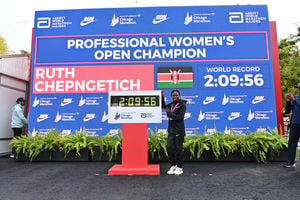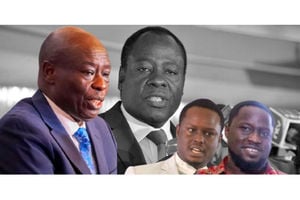Inequality: Women in research jumping higher hurdles

Researchers test the superiority of engineered maize. According to a 2020 Unesco Institute for Statistics report, women only make up 31.1 per cent of researchers in sub-Saharan Africa.
What you need to know:
- While Kenya has made significant strides in increasing women’s and girls’ access to basic education, their participation in higher learning areas such as research is still limited.
- A study conducted by Unesco revealed that African women take 41 per cent longer than male counterparts complete their PhD programmes.
Several obstacles still pave the long road to gender equality in education and research, despite many celebrated wins. One of the agreed-upon ways to bridge the gender gap is increasing access to education for women and girls.
In an earlier interview with Nation.Africa, United States Ambassador Margaret ‘Meg’ Whitman reiterated that education is the shortcut to gender parity.
“It starts with the education of girls. Whether it is politics or business or law or community leadership, we’ve got to educate girls and prepare them to think about themselves as equal members of society,” she said.
While Kenya has made significant strides in increasing women’s and girls’ access to basic education, their participation in higher learning areas such as research is still limited.
According to a 2020 Unesco Institute for Statistics report, women only make up 31.1 per cent of researchers in sub-Saharan Africa. Further, their enrolment for higher education lags behind men’s at a mere 7.9 per cent.
Ms Yvonne Githiora, a PhD student at the University of Nairobi undertaking research in climate change and adaptation, says this can be attributed to time poverty.

Yvonne Githiora, a PhD student in climate change and adaptation, at a Nairobi hotel on October 31, 2022.
Having graduated with bachelor’s and master’s degrees in conservation biology from South Africa, Ms Githiora was ready to grow her career and engage in research. However, after working for one year in a government think-tank, she had a daughter and found herself at a crossroads. She had to choose between motherhood and career.
“I used to express milk for my three-month-old child in the kitchen at work. I would lock myself in there at lunch hour and pump milk,” she says.
Support system
A lack of support system at work prompted her to make the difficult decision of resigning and shelving her research interests for five years. “There was a lot of anxiety during that five-year gap. I was looking for something to do part-time, but there weren't a lot of opportunities. I didn't want to commit to full-time job because I was worried about my children.”
She eventually started from scratch in an intern position before embarking on her research in climate change and adaptation. “When you have not been in circulation for long, you are isolated from networks and do not have knowledge of opportunities. This was also a challenge for me because I did not have funding to support my fieldwork when I started.”
A study conducted by Unesco revealed that African women take 41 per cent longer than their male counterparts complete their PhD programmes. Ms Evaline Sang, a PhD research fellow in agribusiness and climate change, attributes this to financial hurdles.
While she was a high school agriculture teacher, Ms Sang realised that the youth had a negative perception of agriculture. After completing her master’s programme, she decided to pursue her PhD in agribusiness management to change their mindset.
Her first preference was a postgraduate programme abroad due to its fixed timeframe of completion.
“Being a woman, there are so many roles that I play. I am a mother, a wife, a daughter and a friend to many. These people still depend on you. I thought studying abroad would be better because I would be detached from all these responsibilities to concentrate on my studies.”

Evalyne Sang, a PhD student in agribusiness management, at a Nairobi hotel on October 31, 2022.
Financial constraints
However, after two years of unsuccessfully applying for a scholarship, she trained her eyes on Kenyatta University. “I needed to raise about Sh1.75 million for tuition and research fees. My husband supported me with Sh80,000, which I added to my Sh60,000 savings and paid a fraction of the fees required.”
With a fee deficit of over a million shillings, Ms Sang resigned from the Teachers Service Commission and redirected her energy to her PhD programme.
“Along the way, I could not present my research to my supervisors because I had not finished paying the school fees,” she says. “I thought about getting a loan but I could not secure one without my government paycheck.”
Luckily, a staff development programme came up and she was able to secure a scholarship to fund her research. However, the terms of the funding required her to start afresh at the Jomo Kenyatta University of Agriculture and Technology (JKUAT). A programme that would have taken Ms Sang three years to complete took six years instead.
Patriarchal environment
For Dr Therese Umuhoza, the inherent patriarchal environment within epidemiology made her studies difficult. She explains that her field is male-dominated and “it is easier to compete as a man than a woman.”

Dr Therese Umuhoza, an epidemiologist, at a Nairobi hotel on October 31, 2022.
At one point, she says one of her male colleagues told her that she had a strong voice for a woman. “It is interesting when you are negotiating as a woman, the men in senior positions even look at you differently. I have had to learn a few tricks. For instance, I soften my voice when speaking to a man so that they don’t feel threatened,” Dr Umuhoza says.
These, says Fiona Moejes, CEO of Mawazo Institute, are the lived experiences that hinder many women’s participation in research.
“Apart from financing challenges, women also have a skills’ gap. They are not exposed to skills that make them good researchers. Competencies such as proposal and grants’ writing, budgeting and communicating their science to policymakers are still lacking in women,” Ms Moejes says.
To combat these barriers, she says the government should increase funding for women looking to get into research. “Outside of academia, we also would like women to be part of decision-making tables where their input is considered. This is the only way that policies can be inclusive and gender-sensitive.”





